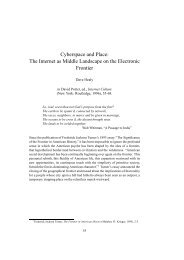PDF - The Metaphysics of Virtual Reality - University of Exeter
PDF - The Metaphysics of Virtual Reality - University of Exeter
PDF - The Metaphysics of Virtual Reality - University of Exeter
Create successful ePaper yourself
Turn your PDF publications into a flip-book with our unique Google optimized e-Paper software.
102 CHAPTER 7. THE EROTIC ONTOLOGY OF CYBERSPACE<br />
Gibson highlights this essentially Gnostic aspect <strong>of</strong> cybertech culture when he describes<br />
the computer addict who despairs at no longer being able to enter the computer<br />
matrix: "For Case, who’d lived for the bodiless exultation <strong>of</strong> cyberspace, it was the<br />
Fall. In the bars he’d frequented as a cowboy hotshot, the elite stance involved a certain<br />
relaxed contempt for the flesh. <strong>The</strong> body was meat. Case fell into the prison <strong>of</strong><br />
his own flesh." 6 <strong>The</strong> surrogate life in cyberspace makes flesh feel like a prison, a fall<br />
from grace, a descent into a dark confusing reality. From the pit <strong>of</strong> life in the body, the<br />
virtual life looks like the virtuous life. Gibson evokes the Gnostic-Platonic-Manichean<br />
contempt for earthy, earthly existence.<br />
Today’s computer communication cuts the physical face out <strong>of</strong> the communication<br />
process. Computers stick the windows <strong>of</strong> the soul behind monitors, headsets, and datasuits.<br />
Even video conferencing adds only a simulation <strong>of</strong> face-to-face meeting, only<br />
a representation or an appearance <strong>of</strong> real meeting. <strong>The</strong> living, nonrepresentable face<br />
is the primal source <strong>of</strong> responsibility, the direct, warm link between private bodies.<br />
Without directly meeting others physically, our ethics languishes. Face-to-face communication,<br />
the fleshly bond between people, supports a longterm warmth and loyalty,<br />
a sense <strong>of</strong> obligation for which the computer-mediated communities have not yet been<br />
tested. Computer networks <strong>of</strong>fer a certain sense <strong>of</strong> belonging, to be sure, but the sense<br />
<strong>of</strong> belonging circulates primarily among a special group <strong>of</strong> pioneers. How long and<br />
how deep are the personal relationships that develop outside embodied presence? <strong>The</strong><br />
face is the primal interface, more basic than any machine mediation. <strong>The</strong> physical eyes<br />
are the windows that establish the neighborhood <strong>of</strong> trust. Without the direct experience<br />
<strong>of</strong> the human face, ethical awareness shrinks and rudeness enters. Examples abound.<br />
John Coates, spokesperson for the WELL in northern California says: ‘Some people<br />
just lose good manners on line. You can really feel insulated and protected from people<br />
if you’re not looking at them– nobody can take a swing at you. On occasion, we’ve<br />
stepped in to request more diplomacy. One time we had to ask someone to go away." 7<br />
6 Gibson, Neuromancer, p. 6.<br />
7 Quoted in Steve Rosenthal, "Turn On, Dial Up, Tune In," Electric Word, November-December 1989,<br />
p. 35.
















